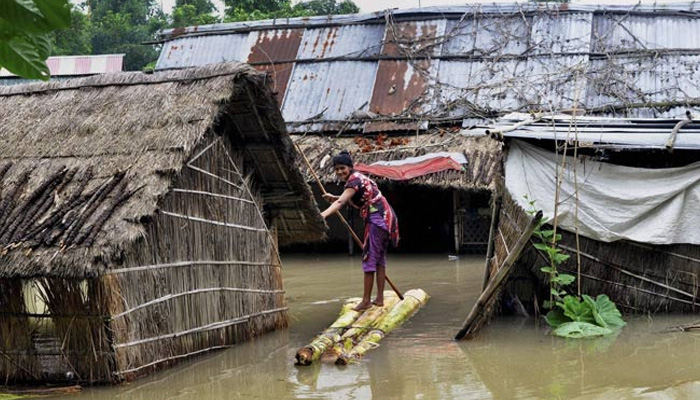Why Isn't Anyone Talking About The Assam Floods?

NEW DELHI: Assam was briefly in the news, as political rhetoric focused on the issue of immigration in the poll bound state. Since then, however, Assam has once again been relegated to the inner pages, even as the first wave of floods in the state has affected almost one lakh people.
In the last few days, flood waters have destroyed 5,000 hectares of crop area. Over 7000 people have been displaced, being house in temporary relief camps. the army, NDRF and SDRF personnel have been deployed for relief and rescue operations.
According to an official release by the Assam State Disaster Management Authority (ASDMA), nearly one lakh people were affected in in Jorhat, Sivasagar, Tinsukia, Dibrugarh, Cachar and Charaideo districts. The reports note that currently, Burhidihing and Desang Naglamuraga rivers were flowing above the danger mark in Sivasagar.
Meanwhile, torrential rains have triggered landslides in Arunachal Pradesh, Nagaland and Assam. Railways traffic has been disrupted to affected areas for three consecutive days. According to official reports, landslides have cut off Anjaw district in eastern Arunachal Pradesh and Mon district in Nagaland.
The situation prompted the All Assam Students’ Union (AASU) to demand that the centre declare the floods in Assam a national emergency. In a statement, AASU president Dipanka Kumar Nath and general secretary Lurinjyoti Gogoi, said that incessant rain, thunderstorms and hailstorms had rendered thousands of people homeless, and added that it was the responsibility of the government to provide relief. The organisation asked the central government for aid -- on the lines of aid provided to Jammu and Kashmir, Bihar and Tamil Nadu during floods.
The state unit of the Congress, too, has accused the centre of maintaining silence over the floods. "Assam is reeling from the devastating flood. Unfortunately, we do not hear anyone from BJP talking about the damages wreaked by the floods. In the run-up to the assembly election, they showered people with promises. Now that the election is over, they have fallen silent," Assam Pradesh Congress Committee (APCC) president Anjan Dutta said on Monday. Dutta blamed the Centre for not extending funds to Assam, whereas other states have been given rescue and relief aid. "If the Centre and BJP really cared for Assam's sufferings, they would have included the state. This attitude speaks volumes about BJP's concern for the welfare of the state and its people," Dutta charged.
Despite the limited blame game, the devastating situation has remained almost entirely absent from mainstream media and political discourse. This was all the more evident when BJP MP from Assam, Ram Prasad Sharma, rode a horse to Parliament, choosing to highlight his objection to the AAP government’s odd-even scheme as opposed to the calamity affecting his state.
Leaders across political parties, who had dominated headlines with quotable quotes while their parties were campaigning in the state, have remained mum on the floods.
The silence reiterates the perception that as far as mainstream India is concerned, the northeast is nothing but a periphery, where calamity and crisis are not worthy of front page news or political attention.
Meanwhile, large parts of south and central India are gripped by one of the worst droughts in Indian history, as village wells have almost entirely dried up and villagers are dependent on government provided tankers that meet only a small proportion of their daily water needs.
Civil society activists recently penned an open letter to Prime Minister Narendra Modi, stating that inadequate action was being taken regarding the severe drought. In the letter, Aruna Roy, Jean Dreze, Harsh Mander, Anand Patwardhan, Prabhat Patnaik, Arundhati Roy, Jayati Ghosh, Amit Bhaduri and several others, said:
“The highest priority of the central government in a drought situation should be to ensure the creation of millions of additional person-days of work in all affected villages. Instead, the government has not even allocated enough funds this year to sustain the level of employment generated last year – 233 crore person-days according to official data. At current levels of expenditure per person-day, this would cost well over Rs 50,000 crores. Yet the central government has allocated just Rs 38,500 crores to MGNREGA this year, of which more than Rs 12,000 crores are required to clear pending liabilities. These liabilities, only prove the distress crores of workers have been put through because of wages left unpaid for months at a time. Unemployment allowance and mandatory compensation for delayed wage payments, are also not paid citing “insufficient funds”, resulting in a failure of the Act, and its legal safeguards. Most alarming today, is that instead of expanding, MGNREGA is all set to contract in this critical drought year, unless financial allocations are vastly expanded.
The enormous distress – of food, drinking water, work, fodder for animals, and dignity – of hundred of millions is utterly unacceptable. We demand that the central government under your leadership acknowledges these failures and makes rapid amends, by implementing all the traditional relief measures as well as by ensuring full implementation of the National Food Security Act 2013 and the Mahatma Gandhi National Rural Employment Guarantee Act 2005 in letter and spirit.”
The full letter can be read here.



